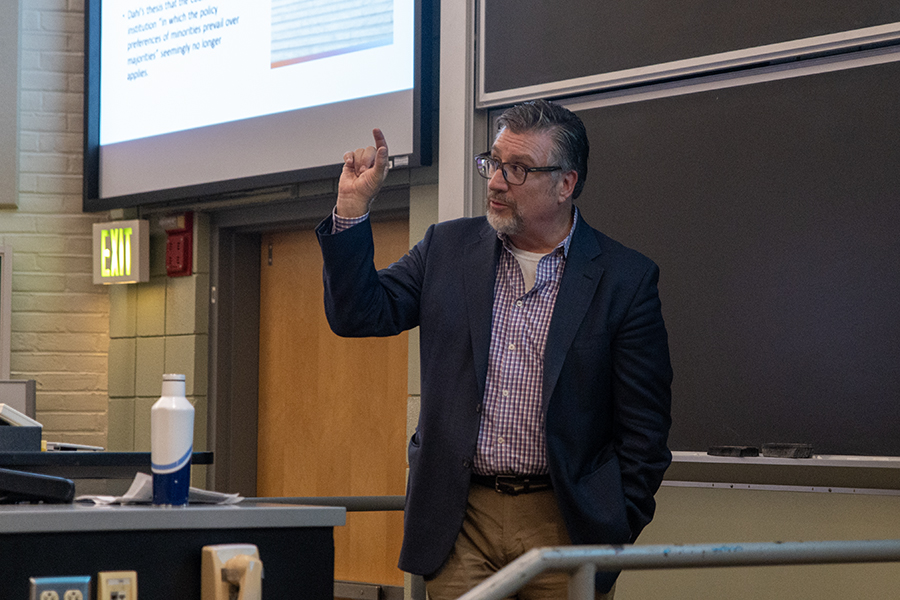On Sept. 14, Ithaca College’s Legal Studies Program sponsored the public lecture event, “A Supreme Court Unlike Any Other,” in honor of Constitution Day on Sept. 17 — a day in commemoration of the signing of the United States Constitution in 1787.
The lecture was centered around the Supreme Court and the causes of its current state, including discussions about whether the Supreme Court has lost its democratic ideals and has become a game of politics, rather than the impartial system it was designed to be.
Don Beachler, professor in the Department of Politics, introduced the featured speaker.
“Our speaker tonight is Kevin McMahon,” Beachler said. “Kevin once taught at Ithaca College from 1997 to 1999. Spending a couple of years across the hall from him, I learned a lot.”
McMahon, professor in the Department of Political Science and director of the graduate program at Trinity College, discussed the current Supreme Court and how that impacts the ideal of We the People — the preamble in the Constitution that describes how citizens give government power.
McMahon is an award-winning author for his books “Reconsidering Roosevelt on Race” and “Nixon’s Court,” winning the American Political Science Association’s Richard E. Neustadt Award and the Erwin N. Griswold Book Prize respectively, according to Trinity College.
The lecture focused on the topics in McMahon’s upcoming book, “A Supreme Court Unlike Any Other: The Deepening Divides Between the Justices and the People,” where he questions the legitimacy of the court. The book will be published in 2024 by the University of Chicago Press.
The makeup of the current Supreme Court is a 6–3 conservative majority that is not short of controversy. McMahon said the Supreme Court has increasingly become separated from the people and the rest of the government, especially because there are no term limits.
McMahon said he believes the Supreme Court is now distinctively different from all courts throughout American history, and questions how these differences came about and its effects on the legitimacy of the court. For instance, for the amount of diversity that the court has gained when it comes to gender and race, it has lost in the diversity in higher education and experiences in law.
“[Prior justices have] lived in different experiences with the law than the justices of today,” McMahon said. “This is the justice of today; you went to the right school, you got a thick envelope from Cambridge, Massachusetts or New Haven. … You then got a key position in the law, you clerked at the court of appeals, clerked at the Supreme Court, then you worked in the justice department. And then before your 40th birthday, you’re appointed to the court of appeals, and then by usually the time you are about 50, you are selected to the Supreme Court.”
McMahon also attributed the cause of the current situation in the court to the senate.
“The role that the senate has played has changed dramatically,” McMahon said. “The senate had a powerful voice in deciding who would sit on the court. Typically, when the Senate was opposed, there was a significant percentage of senators articulating opposition, so the nomination failed. That doesn’t happen anymore. You have nominees who are contentious become justices. Therefore, it is easy for somebody to be confirmed as long as the president and majority are of the same party.”
Since former President Richard Nixon took office in 1969, 20 justices have been appointed to the Supreme Court. However, five of these nominations were made by Democratic presidents while 15 of these nominations were made by Republican presidents, according to NPR.
McMahon continued his point, elaborating on how this impacts the legitimacy of the justices.
“My argument is that when the senate is playing less of a role, when you have nominees being confirmed by very narrow margins, that this undermines the democratic legitimacy of the individuals who get confirmed as justices,” McMahon said.
Senior Grace Santiago, double major in political science and legal studies, asked if the court should have term limits, given the current ages of the justices and amount of time served on the court. The topic of term limits is one that consistently comes up when referring to the Supreme Court.
“One of the proposals is to have 18-year term limits,” McMahon said. “It would allow for and be a schedule for a much less chaotic process. If Ruth Bader Ginsburg had lived for four more months, Roe v. Wade would not have been overturned. Why didn’t she retire before? Because she was waiting for the election.”
Michael Trotti, legal studies coordinator and professor in the Department of History, talked about the current polarization seen in politics today and his concerns about its impact on the Supreme Court specifically.
“[Polarization] really disturbs me on the Supreme Court because it is not as connected to the electorate,” Trotti said. “It sort of feels like the great disease that we have right now in America. … The echo chambers that we’ve got and the way that we are not talking to each other, or even thinking that it is worth talking to each other. This sort of sets the stage for numerical minority justices and a senate so braven.”
McMahon concluded by emphasizing that his critique of the court is not its conservatism but the construction of the court.
“I am critiquing the construction of a court that happens to be conservative, one that has used its institutional authority to aggressively advance its ideological agenda,” McMahon said. “A liberal court built in the same fashion and that acted in the same fashion would be equally inconsistent with the nation’s democratic traditions and its legitimacy would be similarly uncertain.”









